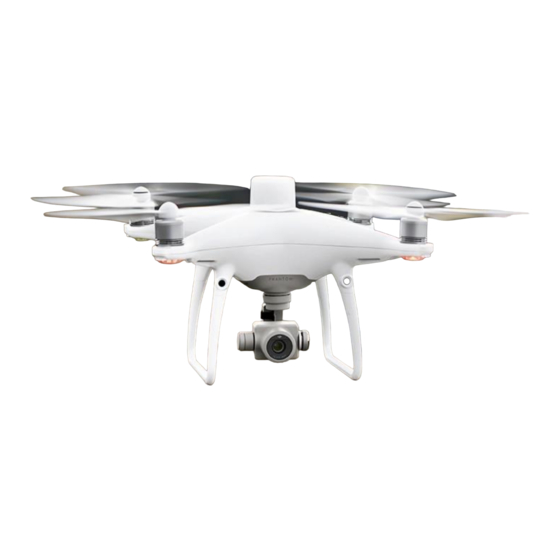dji Phantom 4 RTK Zrzeczenie się odpowiedzialności i instrukcje bezpieczeństwa - Strona 15
Przeglądaj online lub pobierz pdf Zrzeczenie się odpowiedzialności i instrukcje bezpieczeństwa dla Drony dji Phantom 4 RTK. dji Phantom 4 RTK 19 stron. Remote controller
Również dla dji Phantom 4 RTK: Skrócona instrukcja obsługi (10 strony), Instrukcja konfiguracji (7 strony), Podręcznik często zadawanych pytań (17 strony)

11. Binocular sensor contrary to the flight direction is enabled only in the P-mode when the aircraft speed is less than
6 m/s (13.4 mph).
12. The Vision System and Infrared Sensing System are not able to brake and stop the aircraft at a safe distance from
an obstacle if the aircraft speed exceeds 14 m/s (31.3 mph).
13. Please be mindful of blind spots of the Vision System and Infrared Sensing System. Refer the illustrations above
(Grey for blind spots).
Compliance with Regulations & Flight Limits
Regulations
To avoid non-compliant behavior, serious injury and property damage, observe the following rules:
1. DO NOT operate in the vicinity of manned aircraft, regardless of altitude. (Land immediately if necessary)
2. DO NOT fly the aircraft in densely populated areas, including but not limited to cities, sporting events, exhibitions,
and performances.
3. DO NOT fly the aircraft above the authorized altitude. Remain well clear of and DO NOT interfere with manned
aircraft operations. Be aware of and avoid other aircraft and obstacles at all times.
To avoid non-compliant behavior, serious injury and property damage, observe the following rules:
1. DO NOT fly the aircraft near or inside no fly zones specified by local laws and regulations. The no fly zone
list includes: airports, borders between two sovereign countries or regions, major cities/regions, etc., and is
continuously updated. DO NOT fly around sensitive infrastructure or property such as power stations, water
treatment facilities, correctional facilities, heavily traveled roadways, government facilities, military zones, etc.
2. DO NOT fly the aircraft above the authorized altitude
3. ALWAYS keep your aircraft within visual line of sight (VLOS), and use an observer to assist if needed.
4. NEVER use the aircraft to carry illegal or dangerous goods/payloads.
1. Make sure you understand the nature/type of your flight operation (such as for recreation, for public use, or for commercial use) and
have obtained corresponding approval and clearance from the related government agencies before flight. Consult with your
local regulators for comprehensive definitions and specific requirements. For users operating their aircraft in the United
States, please first visit http://www.knowbeforeyoufly.org/ and take the most appropriate action that suits your
circumstances.
2. Please note that remote controlled aircraft may be banned from conducting commercial activities in certain
countries and regions. Check and follow all local laws and ordinances before flying as those rules may differ from
those stated here.
3. Respect the privacy of others when using the camera. DO NOT conduct surveillance operations such as
image capture or video recording on any person, entity, event, performance, exhibition, and property without
authorization or where there is an expectation of privacy, even if the image or video is captured for personal use.
4. Please be advised that in certain areas, the recording of images and videos from events, performances,
exhibitions, or commercial properties by means of a camera may contravene copyright or other legal rights, even
if the image or video was shot for personal use.
14
©
2018 DJI All Rights Reserved.
